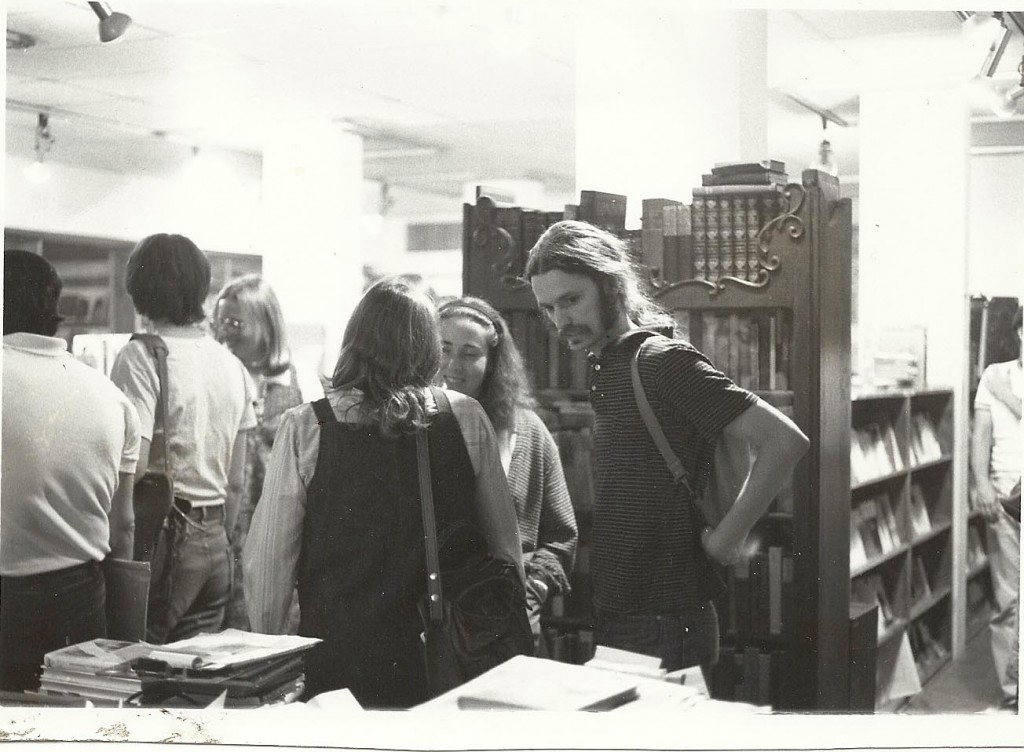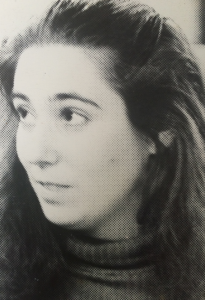Volume 17:1, Winter 2016
Some Of Us Press Issue
Dead Presidents
DEAD PRESIDENTS: whitened trees corner of birch.
Eyes water, eyes reap water water flowing
water falling of those qualities
of which you speak so fondly of
Freedom from self Blood
water shaking my heart. The
muted greys and blues the detail
the sun crime. I did not shine
today. I was always shining. One
Close drop and yours. You moved
slightly and then I followed you
to other numbers. The stillness
convinced me of your
capacity for giving
And the way you moved.
Things do not matter They are
visits from the underworld We
are in a garden each section a
different color the blue ones,
the red ones and the ones of
orchid,
The snow began to fall And
then I remembered
I had been of the flowers.
through which snow had been.
before
What were you?
As the trees looked against the
sky. I did not ask how
If you speak. No I do not wish to
hear the sound of birds they do
not laugh at you they do not
even know you are alive.
An ounce of formed light
years formed picture windows
Do not copy type
The world is ours anyway.
Moulded skin seemed less
vibrant. Each syllable as you
walked through straight. The
word meant something different.
The world did not mean sound.
The doors are locked and down
and down. They did not know
the children ran circles around
the leaves. The closing was not
for them. The air left no trace—
except you.
When you close your eyes you
can see the micro-organisms. They
are long and irregular in their
patterns. We are going across the
mountain. All falling through They
are turning upward toward the an-
cient wall.
And then I looked down I
saw not only thousands of people
but thousands of people making
noises, wailing The stores became
the sanctuary. The exchanging
of toys and playing with them.
The year was sweeter. The begin-
ning of the year. The breeding
of human beings into finer speci-
mens of the race. We had gone
out for a walk. The night was
breathing the daylight they had
just begun their marriage. I
checked the dailing of the sun
and found my answer. I listened.
Trains screech under the grey.
I found my answer. The days
are interims with evenings in
between and afterward.
We had been to the fair and
looked at the exhibits. We had
seen them all before. And all
that the car. What I meant to say
was.
The time being too much to
bear. I leaving others clothed.
The winter is coming. I am
glad.
The trees are escorts. They have
learned to see some of us through.
They have learned which to take
by the hand and which to
channel through. They have
The breeding of the now silent
animals. Time you once said
should be worn about the neck
and moulded into inconsistencies.
I disagreed but was given a neck-
lace. And then I slowly and
carefully placed it around my
neck.
Bless vacancies They breed
welcome invitations. Bless the
vessel moving and the rockets
turning back. I remembered
excretions. I saw you in the
parade. You wore four different
kinds of masks.
And lacking originality I called
them images. You lacked the
ability to reinforce. You lacked
the ability to watch the pieces fall
toward a certain point. You
began to walk with your head
lifted and suddenly you began to
notice things there.
I could never understand why
women put dark lines on their
eyes. then I looked into
the mirror. It is only an exagger-
ation of life the face said back.
The men in white are wise in
their upbringing. They sit and
draw pictures. They are foreign
to human beings. They are close
to pictures. Picture equals picture.
Human being equal and my
mind comes still something
farther than anything I have
known. I read once before we
are all in this together. Freeways
are not ways of freedom. They
cut me.
Dial for joy The naming of
things being temporary. It was
nine thirty. Everything was
closing. The leaves began to
make circles on the cement.
An ounce of two framed hearts
framed this year. The light
framed in two ounces.
one for her moving and one for you.
I remember the time when everyone waited,
The children (Save them
The places (Save them
The turning chairs—(Save them
the terminals and hallways—(The vines.
And then I remembered—(You,
vines are eternally wrapped
around the sturdier plants)—(You
come out fast with that one.
Unwind them quickly.
Tomorrow’s the fun day.
Tomorrow’s filled with fun for
the younger ones. We began to
make liquid into streaming colors
and set them down for others
And they did.
The eyes surrounding terrors.
Trojan heroes before you relin-
quished the throne. It was all not
for honor. I was for knowing
the home was base.
Do you save the coupons?
Could you hold them through
the night. Would the morning
come Would it come that slowly.
It wasn’t that I saw witnesses but
that I was just bye. Smiling
mouths are downgrade.
It was the voice. It was the
voices of people I had known
before. It was my own voice. I
wanted to watch you. The
children are cruel. They find
nothing changed. They find
silence.
Yet something increased in
sound. You sat down and for
the first time in your entire life
you listened and heard some-
thing. that had nothing to do
with you.
You awaken swollen with passivity.
You’re crying out
the accusations. You became the
notion of them.
I remember terms made. I
remember tigers and how each
sound was an interruption one
welcomed. And all of this exact-
ness. Each will grow until you
kill it—It won’t die. Your mouth
hangs off. You
can not live for the children.
They are always growing. I went
home that night in splendor. The
rags of ancient creatures swept
across my eyes. The wind
carried you. Each month had a
different animal. We had gone to
see them all. The dramatic ones
cry out (Save me (save me. (I
merely approach you with my
head out of water. I saw the baby
turn blue. I saw you give it life.
You won’t find them in the
public schools you won’t find
them there they aren’t smiling.
they never smile there. All the
people dress in white. all the
relaxation. You stood up this
time to watch. Instead they
pressed out your eyes.
The eternal watch. The sheep
wanting to follow one another
and looking to see you. Calming
extractions. You can’t find it in
that. I remembered the way to
move and how that felt and how
that was my more vulnerable
period. It wasn’t that. It was
your hand reaching mine. It
was that effort of fingers. Your
laugh your voice and the word
they created. Your outside life
was still that prism. what makes
the lines in the sky? what makes
them so bright? We’re killing our-
selves. every day catfish have long faces.
You can see their insides. The
turtles are flying. They are shoot-
ing up and out into arms and
feet. The rules are my emptiness.
Frost formed inconstant joy.
I become the witness. Birds over
the school they are flying. I
think of you organized in your
death arms folded once more across
the chest. He is running around
the house. looking grandeur in
the sun. Do not scorch these new
days.
The problem is your counting
too much. You’re counting the
money. You’re counting the food.
You’ve even gotten into counting
people. Broken windows reek
fumes from the bodies. The kids
don’t smell this. I do not like
teaching the ancient order. I
like the general thing. I like
the fall when it is.
Old skin. I want these arms to
wait. I want these arms to wish
they were never arms. to grow
old with grace. You coming out
of the house. What is left is this.
You are given X number of child-
ren.
my friend makes noise, she
listens to those around her. She
expects too much. She thinks in
generalities. She is tired. She
knows what she wants. She knows.
You were not a lady. You
travelled too long in trash. A
bath could not clean you now
You dried yourself and began to
play with ideas. Water seemed
the only path.
Nocturnal sense. These
creative centuries. The moment
where you know you had nothing
to lose. If we didn’t have shapes
no arms
The expulsion of evening and what that brought.
Land I cried into. The streets were in the sky. Did you stand in river.
Did you cry. Did you see the order? Did you see?
Dominate the air with your surviving factos. Lists of white animals
cursing your world.
The tribe the tribe I hear your cry.
learned this through each of the
years of their existence. through
the volcanoes and their explod-
ing. They have studied hard at
their work. They have escaped
from the fire. It does not touch.
It freezes in their presence. The
children are out from school
There is nothing to do. I see the
enlargements. They are boring.
You keeping your distance. I in
mine and the vehicles formed by
these. They have set too long to
dry. Kindness was not enough.
I wanted more.

Lynn Dreyer and P. Inman at Folio Books, Washington, DC, 1970s. With back to camera (l. to r.): Ted Greenwald, Terence Winch, Inga Shirer, Tina Darragh. Photo by Jesse Winch.
Old Fashioned People Sitting on Rocks
I am a wallowing wasp. I am a
desperate desert. Cars, riding.
Red flowers inside of the hair
Songs to give: It will give a reason to live
It will give independence.
Street songs—and how the two
words fit together. Before I stop-
ped wanting you. Before the
eyes became terrified. Merge
singing songs of streets be-
fore before, And walking
before the walks were there and
us and you and if I understood
and lost the number and fell
cringing with pain and laughing
you look down and
say you are well
your eyes are small
the need to live No need to live.
There is a box in storage in the storage
room. Take them—somewhere.
Dreyer first learned about the Mass Transit poetry readings, and from there about Some Of Us Press, through Liam Rector, who she’d met when they “both studied with Rudd Fleming at UofMd.” Dreyer adds: “I was living in VA and working with DC Dept of Recreation. I would take the bus in and home again waiting for it late at night near the Mall, when u could still do that. I have lots of memories of the bus!”
Lynne Dreyer (1950 - ) was born in Baltimore, moved to DC in the 1970s, and now lives in Falls Church, VA, with her husband David Jacobs, a veterinarian. Until her retirement in 2009, she worked for thirty years as a recreational therapist, serving clients in the Baltimore City Public Schools, DC Recreation Department, and the Georgetown Hospital Pediatric Outpatient Oncology Art Therapy Department. Dreyer is the author of five books of poems: The Under Arc (Primary Writing, forthcoming), The White Museum (Roof Books, 1986), Step Work (Tuumba Press, 1983), Stampede (Eel Press, 1976), and Lamplights Used to Feed the Deer (Some Of Us Press, 1973).
